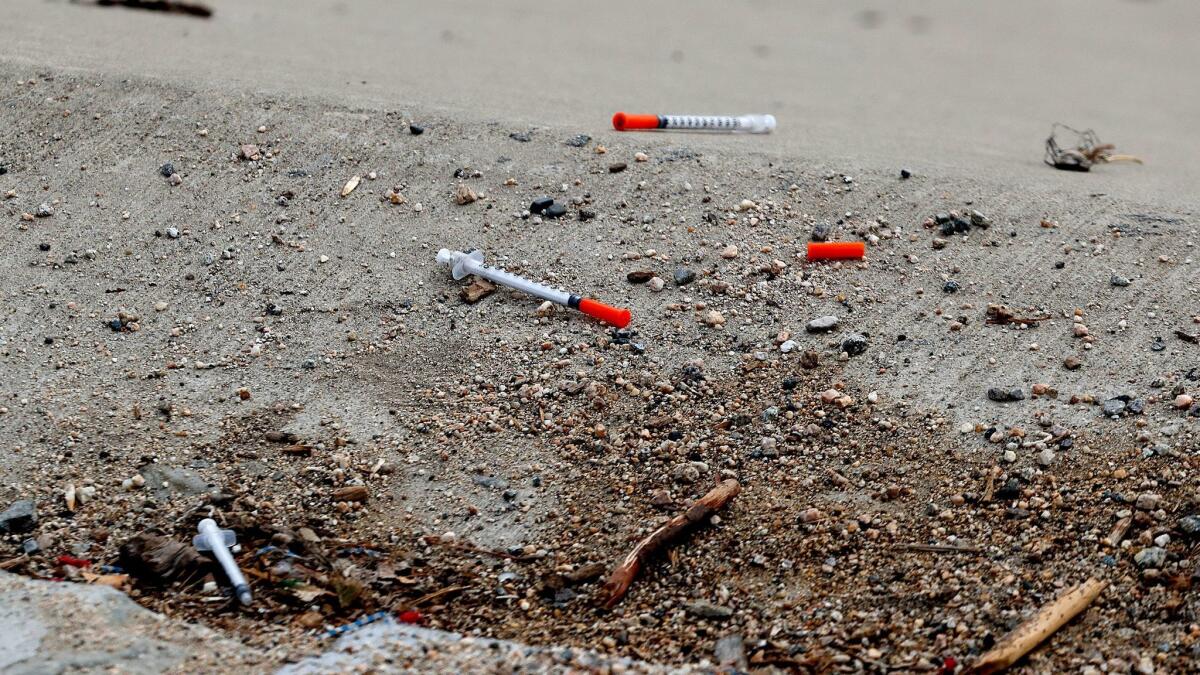Orange County’s only needle exchange shuts down after Santa Ana denies permit

Orange County’s first and only needle exchange program has shut down after Santa Ana city officials denied its permit application, a move some local advocacy groups and the state’s leading public health agency say could negatively affect public welfare.
However, the city contends the move was necessary because of an increased number of discarded syringes in the Santa Ana Civic Center, for which it says the needle exchange was at fault.
Kyle Barbour, co-founder and board member of the Orange County Needle Exchange Program, said the nonprofit’s permit application was denied by the city in mid-January. The group, which operated in the Civic Center, is working on how to get back up and running because it feels needle exchanges are a crucial public health service.
“People are going to die and get infectious diseases,” Barbour said. “There’s no ambiguity that needle exchanges are an effective strategy.”
Needle exchanges seek to provide drug users with clean needles to prevent the spread of infectious diseases, like HIV and hepatitis C, and other harm accrued through needles. The practice is endorsed by the American Medical Assn., the World Health Organization and the Centers for Disease Control and Prevention, among others.
Santa Ana has the highest rate of HIV infection in the county, according to 2016 statistics from the Orange County Health Care Agency. There was a 201.2% increase in hepatitis C rates in Orange County from 2011 to 2015 since the last analysis from the California Department of Public Health.
With the shuttering of the Orange County Needle Exchange Program, the county is devoid of a needle exchange.
“Syringe services programs are an essential component of preventive health care for people who inject drugs,” said Matt Conens, California Department of Public Health spokesman who attributed the information to the agency, in an email. “Scientific studies have consistently found that syringe services programs reduce HIV and viral hepatitis infection and are among the most cost effective tools available.
“While the California Department of Public Health cannot predict the specific results of closing Orange County Needle Exchange Program services, one could expect that it would negatively impact HIV, viral hepatitis, and opioid-overdose prevention efforts in Santa Ana and Orange County.”
The California Department of Public Health is the supervising agency for the Orange County Needle Exchange. The agency recertified the nonprofit on Jan. 12.
Conversely, the city of Santa Ana felt the needle exchange posed a public health issue for visitors and the city and county employees who work nearby.
Robert Cortez, Santa Ana deputy city manager, said by phone that syringe litter became a rampant problem since the needle exchange’s inception.
“A lot of unintended consequences came with the program,” Cortez said. “There was needle debris everywhere in the center, to the point where some of the books at the Santa Ana library had needles inside of them.”
Cortez said employees had been pricked by needles lying around the center.
When asked whether needle litter had been an issue at the Civic Center before the arrival of the needle exchange, Cortez said, “not to the extent that you see now.”
Heather Folmar, Santa Ana Public Library operations manager, said syringe littering was a “huge” problem.
Before the needle exchange opened, library staff rarely found syringes in the facility, but began to find 40 to 50 a month after it opened, she said.
“We found them on shelves, near planters, window sills, in books,” Folmar said. “A cleaning lady was pricked by one.”
She said they’ve found fewer syringes since the needle exchange closed.
The permit rejected by the city was required of homelessness service groups operating in the Civic Center under a city ordinance that became effective in November.
Since opening about two years ago, the needle exchange had been operating under a memorandum of understanding with the city that was terminated, with a 30-day notice, in early December, citing syringe litter.
When the needle exchange opened in February 2016, Santa Ana’s then-Police Chief Carlos Rojas told the Los Angeles Times that the Civic Center made the most sense as the site of the group.
“It’s away from residential areas,” he said at that time. “We have a large homeless population there and a high concentration of IV drug users, so we saw this area as being more beneficial not only for the people who will be using the service, but also from a public safety aspect.”

Barbour said his group has made efforts over the program’s lifespan to temper litter.
The group educates each user on the importance of disposing of syringe litter and provides sharps containers to everybody for needles disposal despite not being legally required to do so, Barbour said.
These containers are also provided to neighboring businesses and the needle exchange offers to pick up and dispose of the containers free of charge, Barbour said.
The organization also seeks to encourage people to return used needles to the exchange by providing them with more needles in return.
Barbour said the group, which has about 15 core members and about 100 volunteers, is willing to do whatever needs to be done to rectify the situation, but it needs help.
“What we are doing is pretty comprehensive, but if we are going to be more comprehensive, we need the city to stop fighting the program and work with us,” Barbour said.
The California Department of Public Health said the Orange County Needle Exchange was operating in a manner consistent with the expectations of syringe services programs supported by the State of California.
When asked about the state agency’s remarks, Cortez said he couldn’t comment on anything other than “the negative impact we’ve suffered here in our city.”
Cortez provided a document with dozens of photos of needles strewn about the public library and surrounding areas.
Other homelessness advocacy leaders also said the closure of the needle exchange will cause negative health issues for the county.
“The loss of the needle exchange will be a public health catastrophe and people will absolutely die,” said Aimee Dunkle, executive director and founder of the Solace Foundation of Orange County, which administers naloxone, a lifesaving overdose reversal drug, at the Civic Center.

The Solace Foundation had been partnering with the needle exchange since it opened, which increased the impact of the foundation.
Barbour said needle exchanges are generally considered to be the “access point” into communities of homeless drug users. Other advocacy and service organizations can be more effective in countering health hazards when partnering with them.
The foundation, which started in 2015 after Dunkle lost a son to a drug overdose, recorded 12 overdose reversals before partnering with the needle exchange.
In 2016, the foundation recorded 420 reversals and reached more than 1,000 last year, Dunkle said.
She believes the foundation’s effectiveness and reach will be significantly diminished with the shuttering of the needle exchange. Dunkle said she also expects to see a rise in infections like methicillin-resistant Staphylococcus aureus (MRSA) and sepsis.
Garrett Dunbar of the Orange County Burrito Project, which feeds burritos to the homeless at the Civic Center, also said loss of the needle exchange would have a negative effect on the community’s welfare.
“Eliminating the needle exchange will only have negative public health implications and increase spending on health care long term,” Dunbar said.
The Orange County Health Care Agency declined to comment.
The agency had listed the implementation of syringe services programs as a desirable strategy in its 2012-2014 Comprehensive HIV Plan to help lower HIV rates by 2015.
“Such programs, implemented as part of a comprehensive approach to HIV prevention, have been shown effective in reducing HIV infection,” the document stated.
Twitter:@benbrazilpilot
All the latest on Orange County from Orange County.
Get our free TimesOC newsletter.
You may occasionally receive promotional content from the Daily Pilot.




